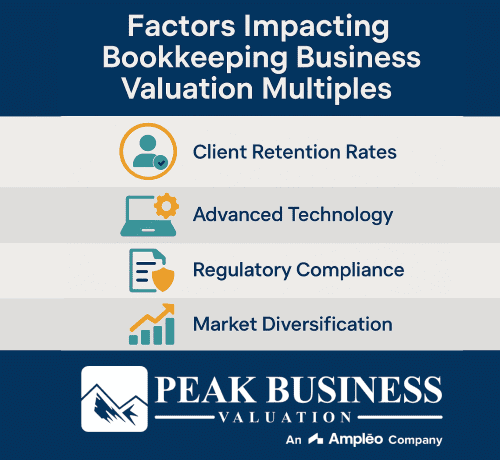
Bookkeeping Business Valuation Multiples
Bookkeeping businesses are third-party providers of essential financial services. This includes financial reporting, account reconciliation, payroll management, and more. These companies are valuable to both businesses and individuals. As such, there are lucrative business opportunities in the bookkeeping industry. If you want to buy, grow, or sell a bookkeeping business, it is important to determine its fair market value. For a broad estimate, business owners and financial professionals often turn to bookkeeping business valuation multiples.
In this article, we explore the most common valuation multiples for a bookkeeping business. These benchmarks offer helpful insight into a company’s worth. However, multiples do not capture the distinct features of each business. For a precise bookkeeping business valuation, consider working with a professional business appraiser.
At Peak Business Valuation, we frequently work with individuals looking to buy, grow, or sell bookkeeping businesses. We are happy to provide a reliable bookkeeping business valuation and answer any questions you may have. Get started by scheduling a free consultation with Peak Business Valuation below!
What Are Bookkeeping Business Valuation Multiples?
Valuation multiples are financial ratios used to estimate the fair market value of a bookkeeping company. These ratios provide general valuations based on specific financial performance indicators. To determine appropriate bookkeeping business valuation multiples, valuation experts assess similar businesses that have recently sold on the open market. For more detailed guidance, see Valuation Multiples for a Bookkeeping Firm.
Common Bookkeeping Business Valuation Multiples
When valuing a bookkeeping business, Peak Business Valuation typically applies multiples based on SDE, EBITDA, and revenue. Each multiple provides a different estimate of a bookkeeping business’s value. Business appraisers often use more than one multiple to ensure a more balanced valuation. Below, we outline each multiple and the typical ranges observed in the bookkeeping industry.
SDE Multiples for a Bookkeeping Business
Seller’s Discretionary Earnings (SDE) represents the total financial benefit available to an owner of a bookkeeping business. This valuation method is particularly helpful for valuing smaller bookkeeping businesses where the owner is heavily involved. SDE is calculated by adding back personal, discretionary, and one-time expenses to the net profit.
Formula: Business Value = SDE × Multiple
Range: Bookkeeping businesses generally sell for 2.55x to 3.32x SDE.
EBITDA Multiples for a Bookkeeping Business
EBITDA stands for Earnings Before Interest, Taxes, Depreciation, and Amortization. This metric is often used to value larger bookkeeping firms, as it reflects profitability from core operations. EBITDA is also beneficial for comparing similar businesses in the industry.
Formula: Business Value = EBITDA × Multiple
Range: On average, bookkeeping businesses transact between 3.51x and 4.58x EBITDA.
Revenue Multiples for a Bookkeeping Business
Revenue multiples evaluate a business based on total annual sales. While revenue can help gauge a bookkeeping business’s size, it does not measure profitability. As such, revenue multiples are generally less precise than earnings-based approaches.
Formula: Business Value = Revenue × Multiple
Range: Bookkeeping businesses often sell within a range of 1.04x to 1.17x revenue.
As a professional business appraiser, Peak Business Valuation utilizes these multiples during a professional business valuation. In addition, we assess the business’s strengths, weaknesses, market conditions, and growth opportunities. If you need a defensible bookkeeping business valuation, we are here to assist! Schedule a free consultation by clicking the button below!
How to Value a Bookkeeping Business Using Multiples
Applying the above multiples can provide a useful estimate of your bookkeeping business’s value. However, understanding which multiples are most suitable requires a trained eye. During a bookkeeping business valuation, a valuation expert determines appropriate multiples and analyzes several key factors. For more information about the valuation process, read How to Value a Bookkeeping Business.
Rules of Thumb for Bookkeeping Businesses
SDE, EBITDA, and revenue multiples are frequently used as rule-of-thumb methods to estimate the value of a bookkeeping business. While these methods are a helpful starting point, they are not a substitute for a formal appraisal. If you need an accurate bookkeeping business valuation, connect with a certified business appraiser. Contact Peak Business Valuation to learn more!
Factors Affecting Bookkeeping Business Valuation Multiples
Several key variables can influence the valuation multiples for a bookkeeping business. Understanding these elements can help owners identify their strengths and areas for improvement. Below, we list a few factors that impact the value of bookkeeping businesses:
- Client Retention Rates: Bookkeeping businesses that demonstrate high client retention are often more stable. This boosts the firm’s overall value.
- Advanced Technology: Investing in new technologies helps streamline operations, lower overhead costs, and enhance service quality. These improvements make the bookkeeping business more appealing to buyers and investors.
- Regulatory Compliance: Strict adherence to federal and state regulations builds credibility, reduces risk, and establishes trust with clients. These factors promote stronger bookkeeping business valuation multiples.
- Market Diversification: Providing services across different industries and client types reduces reliance on a single market or client. This contributes to stability and improves the overall business valuation.
To learn more, check out Value Drivers for a Bookkeeping Firm.

Conclusion
Valuation multiples are helpful tools if you need a broad estimate of a bookkeeping business’s value. However, these tools do not reflect the unique conditions of a company’s opportunities and risks. For the most precise valuation, it is essential to work with a qualified business appraiser. Obtaining a business valuation provides valuable insights into your bookkeeping business’s financial health, risks, and growth opportunities. This enables informed decisions when buying, expanding, or selling a bookkeeping business.
Peak Business Valuation is a trusted business appraiser that frequently helps bookkeeping businesses across the country. We can help you with a business valuation and discuss any questions about bookkeeping business valuation multiples. You can get started by scheduling a free consultation with Peak Business Valuation today!
For more information, read Bookkeeping Business Valuation and Valuing a Bookkeeping Firm.
